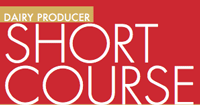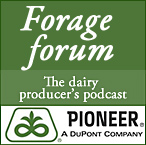 Dairy Markets Week in Review
Dairy Markets Week in Review
Traders viewed the milk production report as bearish although cash cheese moved higher for the sixth week in a row. The block price climbed to $1.40 per pound on Wednesday, but gave back a penny the next day and closed Friday at $1.39, up 2 3/4-cents on the week, and the highest it’s been since December 2008, but that’s 32 1/4-cents below that week a year ago.
Barrel closed at $1.37, up 3 cents on the week, but 29 1/4-cents below a year ago. Twenty five carloads of block traded hands on the week and six of barrel. The NASS U.S. average block price jumped 4.1 cents, to $1.2220. Barrel averaged $1.2594, up 5.3 cents.
Butter dipped to $1.15 on Thursday but recovered some on Friday to close at $1.17, down a nickel on the week, and 44 cents below a year ago. Thirteen cars were sold on the week. NASS butter averaged $1.2081, down 1.5 cents.
Cash Grade A nonfat dry milk closed Friday at 99.50 cents per pound, down a quarter-cent. Extra Grade closed at 95 cents, unchanged on the week. NASS powder averaged 86.84 cents, down 0.2 cent, and dry whey averaged 29.78, up 0.9 cent.
There were no price support purchases on the week for the first time since October 2008. DEIP bid acceptances included 2.2 million pounds of nonfat dry milk, 220,460 pounds of cheese, 661,380 pounds of anhydrous milkfat, and 2.2 million pounds of butter.
Provided courtesy of Dairyline.

 The
The  Dairy producers in Wisconsin have the opportunity to hone their skills and learn new ones with the
Dairy producers in Wisconsin have the opportunity to hone their skills and learn new ones with the 
 Here is our next installment in a series of online Dairy Producer Short Courses from our sponsor,
Here is our next installment in a series of online Dairy Producer Short Courses from our sponsor,  Bunker management can have a serious impact on the nutritional value of silage. Most management revolves around keeping oxygen out of the forage mass. Paul Porter,
Bunker management can have a serious impact on the nutritional value of silage. Most management revolves around keeping oxygen out of the forage mass. Paul Porter,  The
The 
 The
The